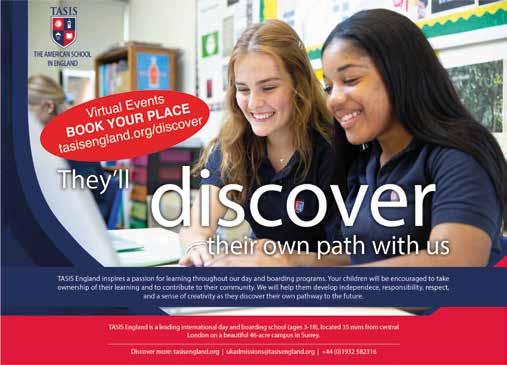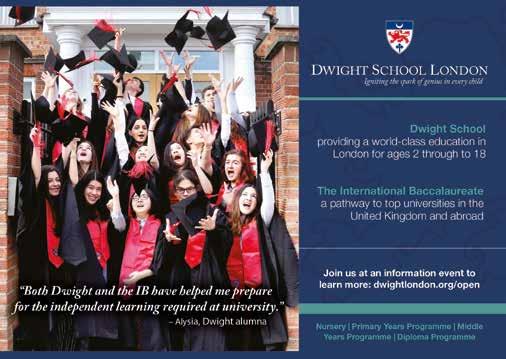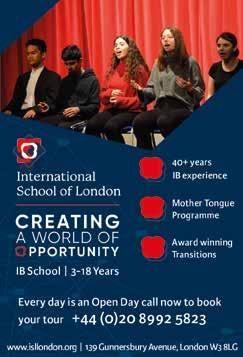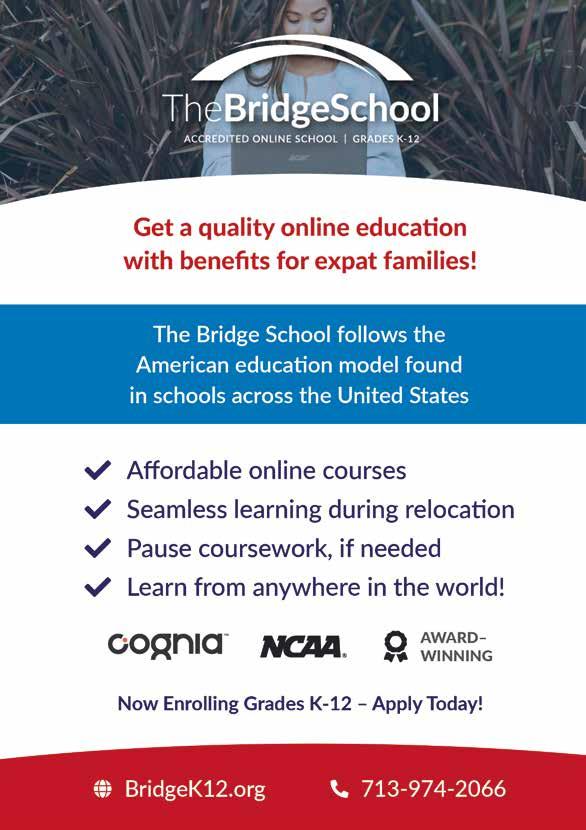
26 minute read
Education & Schooling
SCHOOLING IN THE UK
While there are a variety of educational options available in the UK, there is no ‘one size fits all’ solution for the children of expatriate professionals on assignment here. This section of the guide will describe these options and highlight some of the matters that should be considered by parents and relocation or HR professionals working with these families.
Advertisement
VISA AND RESIDENCY REQUIREMENTS
Schools are required to verify that children have the right to (free) state education, and so showing the appropriate passports and visas are a prerequisite for admission to any state school. This now also applies to independent schools if they are registered with the UK Border Agency to be ‘sponsors’, which means that they are able to support student visa applications. Some schools may also ask to see copies of the parents’ visa status. Since January first following the Brexit transition period, any EU passport holders must apply for European Settlement Scheme to be eligible for residence and education in the UK. Europeans who were resident in the UK by 31 December, 2020, have until 30 June, 2021, to apply for this status. If your employer is bringing you to the UK to work, they will most likely manage the Tier 2 visas process for your dependent children. If you are coming to the UK as a business investor on a Tier 1 visa, you may need to have the support of the school to secure a visa for your child. Any students holding visas may also be asked to provide a copy their BRP (Biometric Residency Permit).
ENGLISH STATE SCHOOLS
Compulsory education serves children ages 4-16, with an additional two years ending at age 18. Children must be in school during the year they turn 5, until they complete their education at 16. In England and Wales, state (publicly-funded) schools are organised by local education authorities (LEAs). In many authorities, particularly in greater London, many ‘good’ state schools are over-subscribed. Each spring, LEAs publicise on their websites the timeline and deadlines for applications and the allocation of places. Because of the popularity of some schools, most families who meet the criteria to be eligible to apply, tend to apply for places in more than one school, indicating the desired schools in order of preference on their application. One of the criteria is that a family must show proof of residency within the LEA, which presents a challenge for expats who understandably prefer not to commit to a property until they know where their child is going to school. The LEA has an obligation to provide a school place for qualifying residents, but it may not necessarily be at the school that is closest to the child’s home. Once the places are allocated, there are means for appealing the decision - procedures are also published on the LEA websites. For families arriving out of the registration season, they obviously can apply for places, but allocation will depend on where the vacancies exist.
Free Schools were a new concept in England introduced by the government in 2011 to allow for more parental freedom of choice. These are state-funded schools that have opted out of Local Authority Control, but rather are governed by non-profit charitable trusts, and they are academically non-selective up to the age of 15, after that they may set criteria for admission. These may be managed by parents, teachers, charities or businesses. Although they are subject to the same inspections as other state and independent schools, the efficacy of these schools have been questioned. Many started in temporary accommodation that they have outgrown or whose tenancy has ended, some have changed management and also their ethos as a result. Yet 2019, the Government announced the approval for the opening of 220 new free schools. The jury is still out as to the quality of these schools, which, according to press reports, can vary significantly. Families considering free schools should do their homework.
Faith Schools are long established with Church of England, Roman Catholic, Jewish affiliation, and Muslim ties. These schools are
state schools but with an emphasis on creed of the faith in question, and although admission may give priority to family’s proven affiliation to that faith (for example, proof of baptism), there is increasing pressure for these schools to become more inclusive of all.
Academies are another relatively new model of state-funded schools, again, independent of the local education authority. Introduced by the Government in 2000, these may be established by companies, charitable trusts, or philanthropists, and may have an emphasis on special areas such as Science and Maths, Technology, Business and Enterprise, the Arts, International Baccalaureate, etc. There are now over 8000 Academies that manage their own admissions using their own admissions criteria that must be transparent. Academies are coeducational, and some have the entire range from 4-18, which is relatively unusual in the UK, but may be of interest to expatriate families seeking one school for all their children.
INTERNATIONAL SCHOOLS
The UK, and greater London in particular, has a good number of ‘international schools’. There is no agreed definition of what exactly makes a school ‘international’; and some of the following comments may characterise these schools: • Schools that seek to attract and recruit international families to create an internationally-diverse student community, regardless of the curriculum they offer • Schools that offer more internationallystyled curricula such as the International
Baccalaureate programmes, the International Primary Curriculum and International Middle
Years Curriculum. Some schools offering the International General Certificate of
Secondary Education (for students at age 16), which was originally intended for British schools abroad, but which some believe are more rigorous than the regular GCSEs, while others suggest they are better preparation for
A-Levels (or the International Baccalaureate
Diploma or IB Careers Programme) which lead to university entry • Schools that feature instruction in many mother tongue languages as part of the academic programme • Schools that pro-actively aim to help prepare students for moving on to another country (and not just the UK) for continued schooling or for university entry. In short, any school can describe itself as ‘international’ and it is up to the discerning parent to decipher what that means in each case!
FOREIGN NATIONAL SCHOOLS & BILINGUAL SCHOOLS
In greater London there are schools that follow the national curriculum of other countries, most likely taught in that language, although some are aiming to be bilingual. Most of these schools, though not all, have some official affiliation with, and recognition from, the country of origin. These include French, German, Japanese, Spanish, Italian, Swedish, Norwegian, Danish, Russian, USA, and possibly others. These schools will either ensure that at the very least the students masters and maintains fluency in the language of the country, others will ensure official alignment to the home country educational programme to facilitate the transfer between the UK-based school and the home country school system.
Also emerging are schools that describe themselves as ‘bilingual’ schools. Although these schools may not deliver the curriculum of the country/ies associated with the language, they do aim to develop complete fluency in English and the language in question. There are now bilingual schools offering English and French, Danish, Greek, Mandarin, Arabic and Italian (mentioned earlier), found in the UK, predominantly in the London area. There are
no standards as to what qualifies a school as ‘bilingual’, but most language experts would suggest that in an English-speaking country such as the UK, at least 50% of the school day should be in the other language for balanced bilingualism to be developed in a child.
There are also a number of ‘Saturday schools’ which offer supplementary mother tongue language classes in a wide arrange of languages for students of all ages. These are separate and distinct from the bilingual schools mentioned above. Some may offer elements of the official ‘home country’ language curriculum. These are often located within schools, church halls or other civic spaces and are intended to help native speakers maintain and develop mother-tongue proficiency in the language. Check online or with the relevant embassies for more information.
PRIMARY SCHOOL
Key Stage 1 – ages 5-7 (Years 1 and 2) Key Stage 2 – ages 7-11 (Years 3, 4, 5 and 6) The Eleven Plus exams are administered by some schools at the end of primary school, and are used for admission purposes to some independent schools, but also to Grammar Schools.
Grammar Schools are state schools that still exist in some local education authorities and are particularly popular in counties such as Kent and Buckinghamshire. Consequently, these schools are often over-subscribed.
CURRICULUM
The National Curriculum for England is divided into the following compulsory stages, each with subject content, skills and learning objectives taught, and assessment criteria set out by the national government. There are assessment tests at the end of each key stage to measure individual student progress, and with results from schools reported in ‘league tables’ that are published in the press.
SECONDARY SCHOOL
Key Stage 3 – ages 11-14 (Years 7, 8 and 9) Key Stage 4 – ages 14 – 16 (Years 10 and 11) also known as 5th form when the two-year GSCE examinations take place. The General

Certificate of Secondary Education (GCSE) is taken in a range of subjects and each subject ends with its own national examination on a prescribed day. The average number of GCSEs taken is 10, according to press reports, although in some ‘hot house’ schools, students may sit as many as 15. The GCSE is regarded as an official school-leaving qualification that can lead to vocational training or basic employment. more prestigious, long established independent schools in Britain (examples include Eton, Winchester, Harrow, Westminster, Winchester, and others). Expats are urged not to confuse ‘public schools’ (private) with ‘state schools’ (state-funded).
Many of these schools tend to be single-sex schools, and few are 'through' schools serving 3-18 year olds. They will include the following:
NON-COMPULSORY SCHOOLING
Pre-5 EYFS (Early Years Foundation Stage) ages infancy – 5 years (starting with childcare, nurseries, pre-schools, etc., to Reception). Post 16 AS and A-Levels – (Years 12-13) also known as 6th form when one/two year AS and A-Level examinations take place. These qualifications lead to university admission and improved employment. Four (more in some schools) subjects are taken in the first year, then three continued into the second. As expat professionals tend to be well educated themselves and highly aspirational with expectations that their children will be prepared for university, it is almost unheard of for the children of expats to finish their schooling at 16 at the end of GCSEs.
NVQ (National Vocation Qualifications*), B-TEC (work or industry-related qualifications).
BRITISH INDEPENDENT SCHOOLS
The British private school sector is popular and, like many state schools, often over-subscribed making entry highly competitive. These are fee-paying schools and admission is normally selective. These schools are not required to adhere to the National Curriculum and may offer programmes that are aimed at preparing children for the next stage of schooling which is typically accessed through entrance examinations set by the individual schools or groups of schools. The challenge for expatriate families is that their children may not have been prepared to sit these examinations which can make the process stressful.
Just to complicate matters, the term ‘public school’ is used to describe a group of some of the
NURSERY SCHOOLS
Ages 2-4, normally co-educational
PRE-PREPARATORY SCHOOLS
Ages 2 (or 3) to 7 Because these schools are often part of established preparatory Schools (see below), admission to these schools can be highly competitive.
PREPARATORY SCHOOLS
Ages 7 (sometimes 8) to 11 (girls) or 13 (boys) As the name indicates, these schools prepare students for the next stage of education in independent senior ‘public’ schools, many of which will be boarding schools. Most preparatory schools culminate in exam preparation for the ‘Common Entrance’ Exams which secondary independent or ‘public’ schools require for admission. These schools are more often than not single-sex schools.
SENIOR SCHOOLS
Age 11 (girls) or 13 (boys) to 19 These schools are often prestigious schools, many with historic legacies that make them highly sought after and competitive. Many of these schools are single-sex, though there are a few coeducational schools of very high standing. Though many students join the school at the entry age of 11 or 13 where they are prepared for the GCSE Exams at age 16; some schools have another intake at age 16 in anticipation of the final two years of the programme (sixth form) when students begin the A-Level or IB Diploma curricula.
Admission to these schools is by examination; for entry into the final two years (sixth form) the student’s GCSE results are likely to be what determines admission.


THE INTERNATIONAL BACCALAUREATE CURRICULA
Now over 50 years old, the International Baccalaureate programmes was originally a twoyear diploma programme offered in the final two years of secondary school to serve the needs of families moving internationally. The IB is managed by a non-profit foundation based in Switzerland that has long had consultative status with UNESCO. Designed by a team of educationalists representing universities and ministries of education from different countries, it offers academic rigour and depth, but also breadth in that students choose a minimum of courses from six areas including two languages (first language and a second language), maths, science, humanities, and a sixth option. Three are taken at a higher level (hence, the ‘depth’), and three at standard level. In addition, all students must take the Theory of Knowledge (a popular course exploring the basis of knowledge), complete 150 hours of creativity, activity and service, and write a 4000-word research essay on a subject of their choice. The IB leads to university entry worldwide. It is roughly equivalent to 4 1/2 English A-Levels, though it is acknowledged to be more work. The IB Diploma has grown in stature in the UK and its IB graduates are increasingly sought after by UK universities that value the preparation and skills demonstrated by IB graduates. As much of the assessment of the IB Diploma is externally-marked by examiners worldwide, it has remained free of grade inflation that some suggest has affected A-Level examinations. It also offers flexibility to enable schools to draw on a local national perspective alongside an international perspective so that students may learn about the countries they live in while at the same time considering their home nationality or culture of heritage.
Following the popularity of the IB Diploma, in the 1990s the IB developed the IB Primary Years Programme for children ages 3-11 (or 12), and shortly thereafter, the IB Middle Years Programme for students aged 11-16, which also leads to the IBMYP Certificate. The IBYP reflect many of the same attributes and characteristics as the original Diploma. They are inquiry-based, aimed at students with a variety of previous learning experiences, are cross-curricular so that students can see the connections of knowledge and subjects (simple examples of this are, how history may influence art; how technology may influence developments in science). Students are assessed by a variety of methods (not just traditional examination) and although the IB programmes are moderated by the IB organisation, all of the assessment is internal. External assessment and 'eAssessments' now feature as an option at the end of the IBMYP, but not all UK schools offering the IBMYP opt to do these eAssessments. The programmes highlight the importance of language learning, including mother tongue, and the opportunity for students to consider how the skills and knowledge they are gaining applies to their home countries and cultures. In more recent years, the IB has introduced the new IB Careers Programme, a more experiential, hands-on practical programme offered as an alternative to the IB Diploma.
All of the IB Diploma programmes are re-underpinned by the IB Learner Profiles; characteristics and attributes that are regarded as essential to the ‘holistic’ education and to developing 21st century skills that lead to global citizenship.
The IB models are the same all over the world, offering a degree of educational continuity to families who move globally.
THE INTERNATIONAL PRIMARY CURRICULUM (IPC) AND THE INTERNATIONAL MIDDLE YEARS CURRICULUM (IMYC)
These two programmes designed by Britishbased Fieldwork Education and are growing in popularity as an alternative to the International Baccalaureate. The IPC for children aged 3-10 uses a thematic approach with specific learning goals for every area of the curriculum, with an emphasis on developing internationalmindedness. The curriculum has been designed with three guiding questions in mind: What kind of world will our children live and work
in?; What kinds of children are likely to succeed in the world?; and, What kinds of learning will our children need and how should they learn it? The IPC is available worldwide and in an increasing number of UK state schools. IMYC for students aged 11-14 is aligned to Keystage 3 and builds in the IPC. If the success of the IPC is anything to go by, it is likely that the IMYC will be found in more and more British state and independent schools.
Questions to consider when choosing a school for an expat child • When choosing between local English (state or independent) schools, consider how your child may adapt to a different system; how well he or she will fit. Think about how long you will be living in the UK, where your next assignment may be, and how compatible the
English school system will be when your child has to face that next transition. Also it is good to consider whether the school is likely to provide school records and transcripts that you will need for the next move • Particularly for teens, think about likely goals
for university and how well the schools you are considering will prepare your child for higher education, and how much the school will help you navigate the university admissions process to the university/ies of your choice • If English is not your home language, how will the school manage this? Is there a programme available to support your child's English language development, and if so at what cost?
Or, will you need to arrange private tutoring, and what is the school’s attitude about that? • Also, if English is not your home language, consider how you will ensure that your child continues to develop literacy and academic proficiency in his or her mother tongue, particularly if he or she is likely to return to your home country for study or work. If the schools you are considering will not support it, think about how you will manage this independently through a Saturday school or private tutors • Speak to colleagues to get a sense as to just how many school applications you should submit. These incur costs, but if the schools are known for waiting lists, you may need to apply to several. If you have more

than one child, ask about the chances of all the children being accepted, or sibling admissions policies • Avoid making any commitments about housing until you know your school options. If you have a look-see trip to plan your relocation, be sure to include the schools early on. No point looking at houses in areas that are impractical for the schools that interest you • Consider transportation issues. State schools do not provide school buses as may be the case in some countries. On the other hand, all students in full-time education travel free on public buses (and at a reduced fare on the
London Underground). Some schools provide school transportation through their own buses or through outsourced services • Carefully consider the implications of applying to separate schools for your children, for example, single sex schools for sons and daughters, or primary and secondary schools.
Consider school hours (and pick up or bus schedules) and pay attention to school holiday schedules which can vary between schools • On this note, you should be aware that the
Government now allows Local Authorities to charge parents £60 for each child taken out of school without permission. After 21 days, this fee goes up to £120, and after 28 days, parents can be prosecuted. In 2016-17, over 260,000 penalty notices were issued, and one parent’s attempt to overrule this – taking it all the way to the Supreme Court – failed. So, expat families who may be likely to take their child/ ren away during term time should consider the implications very carefully. (This relates to state schools) • Read the admissions requirements carefully and submit all the documents required. Some schools may have deadlines for this. Some schools require several components to the application and will not begin to process until all are submitted. Check to ensure your child’s current school has completed references, sent reports, etc., as the new school may not accept copies you provide and may not process the application until it is complete • If your child has had any external assessments, for example, speech and language or educational diagnostic reports, be ready to provide copies to the school.
Don’t ‘hide’ anything about your child’s academic or learning history. If the prospective school suspects something, this may delay the process • If your children’s school reports or other supporting documents are written in a language other than English, you may be required to submit official translations. However, some international schools may have members of staff who can interpret the report for the
Admissions Office. Check with the school • If testing is involved and you are applying from abroad, ask whether your child can be tested in the familiar environment of the place you now live. This may require the assistance of the present school, an embassy, The British
Council, or bonafide educational consultant. If an interview with your child is required, think about how and when you will be able to do that.
Consider about how your child will present at an interview, particularly if travelling a long distance to do this. Many international schools accustomed to expatriate families who are relocating will not require interviews • Have a back-up plan. You may not need to apply for more than one school at first, but if that does not work for whatever reason, be prepared. This is particularly important if those schools require documents from your present school; too often applications are delayed because key staff are on holiday and reports and references are not sent • Be aware of the financial requirements to confirm acceptance of a place. Having secured an offer, you do not want to risk

losing it because of the financial procedures or complications arising from international bank transfers. If payment of school fees are part of your compensation package, be sure you know who to contact for payment so that the payments are not delayed putting your child’s place in jeopardy. It is also important that you understand the notice period required to withdraw to ensure you do not have to pay the next term’s school fees. (Typically independent schools require one term’s written notice) • Depending on your family’s circumstances it may be helpful to consider what level of support the school may have in place to help your family with the transition. Some schools now arrange ‘buddy families’ with children of the same ages/ language/cultural group. Even if these people do not become your best friends, it’s good to have at least one point of contact from the school community when you arrive.
Be sure to note any orientation events or back to school nights and get those in your diary. Some families thinking that an Orientation event falling before the official first day of school is
not all that essential, a decision they later regret • If the whole business seems too complicated, consider engaging an educational consultant to help. One note of caution: in the UK, anyone can hang up a sign and declare themselves to be an education consultant – there is no professional standard. Best to ask before you commit: a professional educational consultant is paid by you or your company and this should prevent a conflict of interest. Many educational agents charge the family AS
WELL AS seek a commission from the school, which can represent a conflict of interest.
Check out the experience, credentials and reputation of an education consultant or agent before you start down that path.

INSPECTIONS AND ACCREDITATION A brief word about quality assurance. All UK schools are required to undergo inspections, either through OFSTED (the Office for Standards in Education) or alternatively, in the case of many independent schools, through the Independent School Inspectorate (ISI). There are one or two other smaller organisations who

also do these inspections. Schools are required to have the most recent inspection report available on their school’s website, but if you cannot find it buried under the downloadable bus maps (some schools don’t make it easy to find!) then you can google OFSTED or ISI and locate school inspection reports on their websites. Most international schools also opt for one of the international accreditations through Council of International Schools (CIS); New England Association of Schools and Colleges (NEASC) – the US-based body that also accredits US public and independent schools, and universities such as Harvard and Yale in New England; and Middle States Association of Schools and Colleges (MSA) – also US-based. These reports are not required to be posted on the school’s website, but accreditation status means the school has had a thorough inspection of the academic programme (teaching and learning) as well as all operational aspects (governance, budget, employment procedures, facilities).
Foreign national schools may also have national recognition and approval from their home systems – i.e. the French homologue schools. Parents from those systems should ask about the status of the school.
SPECIAL EDUCATIONAL NEEDS
Parents of students who have suspected or diagnosed special educational needs, and/or disabilities, may have to probe a bit more to find an appropriate schooling solution. In the first instance, a plan for SEND (Special Educational Needs and Disabilities) support may be agreed by the parents, teachers and the SEN/SEND Coordinator of the school. This plan should be reviewed at agreed intervals to assess the impact this support is having. If more intervention is merited, the family can request that an Education, Health and Care by the Local Education Authority assessment be undertaken and an EHC plan agreed. This may lead to the school accessing the support of external specialists and therapists available through the local authority, and/or for educational provision to be made in an independent school.
There are a few independent schools that specialise in serving students with specific special educational needs, but places are sometimes difficult to secure and early planning is highly recommended. Some international schools offer learning support for students with special educational needs, but this may be limited and only suitable for children with mild learning challenges. Such schools will want to see a copy of the student’s Educational Learning Plan and/or Educational Psychologists’ reports, and may wish to do their own assessment as part of the admissions process. In these circumstances, parents are encouraged to be open and prepared to offer as much information as the schools require.

HOME SCHOOLING
Home Schooling is allowed in the UK and this is another option for families who prefer this model. It is advisable to check the local authority websites for local insights and to ensure you are complying with local requirements. There are also a few global online home schooling programmes available. Parents considering this should ensure that they are suitably accredited and approved.
A NOTE ABOUT SAFEGUARDING
British requirements surrounding the safeguarding of children have become much tighter in recent years. Schools have a legal obligation to work closely with the Social Services and the Safeguarding Leads of local authorities in this respect. This means the circumstances relating to child abuse or neglect must be reported to the local authorities, and so parents may want to better


understand how ‘abuse’ is defined in Britain. Things such as unexpected or prolonged absence from school, poor hygiene, being left alone for a night without an adult, FGM (Female Genital Mutilation), excessive ‘intimidation’ or bullying by a family member, excessive references to terrorism, may all lead the school authorities to have concerns which they are obliged to report. This is a culturally-charged issue but expatriate families need to understand that they are not exempt from these requirements.
EDUCATION AND COVID 19
Schools globally are impacted by the pandemic and UK schools must follow the guidelines of the devolved governments (England, Scotland, Wales, Northern Ireland). These guidelines have varied between these four governments, and schools will do their best to communicate their current operating contexts. The website is the best source of information for an individual school. While many schools are not permitting parents to visit the schools in order to avoid non-essential extraneous visits to the school, and many independent school admissions offices are working from home, most of these schools continue to provide virtual information days and ‘open houses’, and many will have created a ‘virtual tour’ of the school for their websites. The reality is that in 2020, many expat parents were forced to choose schools, ‘sight unseen’ which can be disconcerting. In this situation, it is very important that parents use as many other resources as possible: scrutinise the websites, reviews, and also don’t be afraid to ask to be introduced to another parent. Good independent schools will do their best to facilitate this. Lastly, if you are joining one of these schools, be sure to get information on how the school is facilitating remote learning when closures occur. The quality of ‘remote learning’ has varied significantly from school to school and if the pandemic’s progress means that more lockdowns are possible, understanding the requirements and what to expect is very important. Expats whose children’s start in the new school may be delayed by visa applications, travel restrictions and quarantine requirements should ask whether and how the school will manage the start of these students, if at all.
Even when schools are open, there may be some changes to timetable structures, movement around the school, transportation arrangements, and extracurricular activities. Parents must also expect some disruption to the statutory exams offered at many schools in Britain as the pandemic has caused some of these to be cancelled or modified.
This article was written by Mary Langford. Mary is an independent education consultant with over 40 years’ experience working in the area of international education. She founded Langford International Education Consultancy Ltd so she could share her expertise on a costeffective project basis with international schools and families in order to improve and enhance the experience of global mobility and transition for children. She manages the International Language and Literature Teachers’ Cooperative - a group of experienced teachers who support IB students worldwide doing School-Supported Self-Taught mother tongue studies in over 40 languages. Mary is also an international education specialist consultant with the Good Schools Guide. She is currently undertaking doctoral studies in education, and she is Director of Admissions at Dwight London School. Email Mary at: mary@langfordiec.com or visit: www.langfordiec.com.








